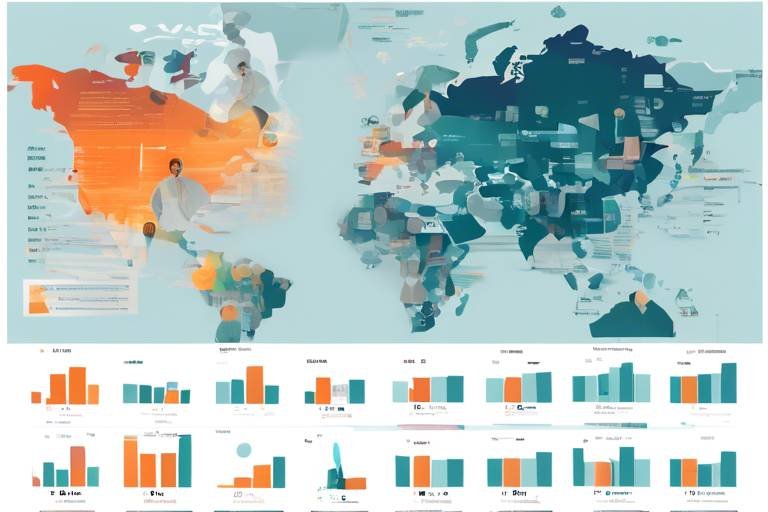The Role of Theory in Informing Research Practices
The world of research is like a vast ocean, teeming with unexplored depths and hidden treasures. At the core of this exploration lies the crucial role of theoretical frameworks. These frameworks act as the compass guiding researchers through the murky waters of data collection and analysis. They help in clarifying complex concepts, providing a structured approach to research design, and ultimately, enabling scholars to contribute meaningful insights to their fields. Without a solid theoretical foundation, research can easily drift into ambiguity, making it challenging to draw clear conclusions.
Theoretical frameworks are not just academic jargon; they are the lenses through which we view the world. Imagine trying to navigate a new city without a map or GPS. You would likely get lost or miss out on key landmarks. Similarly, researchers rely on theories to navigate their studies, ensuring they stay focused on their objectives. This is particularly important in fields like psychology, sociology, and education, where understanding human behavior and societal structures requires a nuanced approach.
Moreover, theories help in establishing a common language among researchers. When scholars from different backgrounds use the same theoretical framework, it fosters collaboration and enhances communication. This shared understanding can lead to more robust discussions and innovative solutions to complex problems. In essence, theories serve as the backbone of academic discourse, allowing researchers to build upon each other's work and advance knowledge collectively.
In addition to guiding research design and interpretation, theoretical frameworks also play a pivotal role in shaping research questions. They help researchers identify gaps in existing literature and formulate questions that address these gaps. For instance, a researcher interested in educational methods might use constructivist theory to explore how students learn best, leading to questions that are both relevant and impactful.
As we delve deeper into the importance of theory in research practices, it's essential to recognize that not all theories are created equal. Some may be more applicable to certain fields or types of research than others. Therefore, understanding the different types of theories and their unique functions is crucial. This knowledge empowers researchers to select the most suitable framework for their studies, ensuring that their findings are grounded in a solid theoretical context.
Theoretical frameworks provide a foundation for research, helping to clarify concepts and guide the research design. They offer a lens through which researchers can interpret their findings and contribute to knowledge.
Different types of theories, such as descriptive, explanatory, and predictive, serve unique purposes in research. Understanding these categories helps researchers select the most appropriate framework for their studies.
Descriptive theories aim to provide a comprehensive overview of phenomena, detailing what exists without explaining why. They are essential for establishing a baseline for further investigation and analysis.
Several descriptive theories exist across disciplines, such as Maslow's Hierarchy of Needs in psychology, which outlines human motivation. These examples illustrate how descriptive theories can frame research questions.
While useful, descriptive theories may lack depth in explaining causes and effects. Researchers should be aware of these limitations when relying solely on descriptive frameworks in their studies.
Explanatory theories delve deeper, aiming to clarify the relationships between variables. They help researchers understand the underlying mechanisms driving observed phenomena, making them crucial for hypothesis testing.
Theories guide researchers in interpreting data, providing context for findings. A solid theoretical foundation helps researchers draw meaningful conclusions and enhances the overall validity of their research.
The implications of a chosen theory can significantly influence research outcomes. Researchers must consider how their theoretical lens shapes the interpretation of data and the conclusions drawn from it.
Applying theory to research can present challenges, including misalignment between theory and practice. Researchers must navigate these complexities to ensure their studies remain relevant and impactful.
- What is a theoretical framework?
A theoretical framework is a structure that guides research by providing a clear foundation for understanding and interpreting data.
- Why are theories important in research?
Theories help clarify concepts, guide research design, and enhance the interpretation of findings, contributing to the overall validity of the research.
- What are the different types of theories?
Common types of theories in research include descriptive, explanatory, and predictive theories, each serving unique purposes.
- How do theories influence research questions?
Theoretical frameworks help researchers identify gaps in existing literature and formulate relevant and impactful research questions.

The Importance of Theoretical Frameworks
This article explores how theoretical frameworks influence research methodologies, guide data interpretation, and shape the overall understanding of phenomena in various academic fields.
Theoretical frameworks are the backbone of research. They provide a solid foundation that helps to clarify concepts and guide the research design. Imagine trying to build a house without a blueprint; it would be chaotic and likely to collapse under its own weight. Similarly, without a theoretical framework, research can become disorganized and lack direction. These frameworks act as a lens through which researchers can interpret their findings, allowing them to contribute meaningfully to the body of knowledge in their respective fields.
Moreover, theoretical frameworks help in identifying the key variables and relationships that need to be examined. By establishing a clear set of concepts, researchers can formulate specific research questions and hypotheses. This clarity not only streamlines the research process but also enhances the credibility of the findings. For instance, in social sciences, a researcher studying social behavior might use a specific theory to focus on variables such as socioeconomic status, culture, and community influence. This targeted approach leads to more reliable and applicable results.
Another critical aspect of theoretical frameworks is their role in ensuring that research remains relevant. In the fast-evolving world of academia, theories are constantly being tested and refined. Researchers who stay grounded in established frameworks can better navigate the complexities of their fields. They can also draw on previous studies, enriching their own work and fostering a collaborative academic environment. Theoretical frameworks serve as a common language among researchers, facilitating discussions and comparisons across studies.
However, it’s essential to recognize that not all frameworks will be suitable for every research project. Choosing the right theoretical lens requires careful consideration of the research objectives and the specific context of the study. Researchers must ask themselves questions like: What do I want to discover? and Which theory best aligns with my research goals? This reflective process is crucial for ensuring that the chosen framework enhances rather than hinders the research.
In summary, theoretical frameworks are indispensable in the research process. They provide clarity, direction, and relevance, enabling researchers to contribute valuable insights to their fields. As we delve deeper into the types of theories and their applications, it becomes clear that understanding these frameworks is essential for any researcher aiming to make a significant impact.
- What is a theoretical framework? A theoretical framework is a structure that guides research by providing a clear set of concepts and relationships that researchers can use to interpret their findings.
- Why are theoretical frameworks important in research? They help clarify concepts, guide research design, and ensure that studies remain relevant and grounded in established knowledge.
- How do I choose the right theoretical framework? Consider your research objectives, the specific context of your study, and which theories align best with your goals.

When we talk about research, it's essential to understand that not all theories are created equal. Different types of theories serve unique purposes, guiding researchers in their quest for knowledge. Let's dive into the various categories of theories that play a pivotal role in shaping research methodologies and outcomes.
First off, we have descriptive theories. These theories are like the initial sketches of a painting; they provide a broad overview of phenomena without delving into the reasons behind them. For instance, Maslow's Hierarchy of Needs is a classic example in psychology that outlines human motivation. It tells us what motivates individuals but stops short of explaining the underlying psychological mechanisms. This type of theory is crucial for setting a foundation for further investigation, allowing researchers to establish what exists before they start asking why.
Next up are explanatory theories. If descriptive theories are the sketches, then explanatory theories are the detailed blueprints. They go beyond mere description to clarify the relationships between variables, helping researchers understand the underlying mechanisms that drive observed phenomena. For example, a researcher might use an explanatory theory to explore how socioeconomic status affects educational attainment. These theories are invaluable for hypothesis testing, allowing researchers to make predictions based on established relationships.
Lastly, we have predictive theories. These theories are like crystal balls, enabling researchers to forecast future events based on past data and relationships. They rely heavily on statistical methods and are often used in fields like economics and social sciences. For instance, a predictive theory might be employed to anticipate consumer behavior based on market trends. By understanding these categories, researchers can select the most appropriate framework for their studies, ensuring their work is both relevant and impactful.
In summary, the types of theories in research—descriptive, explanatory, and predictive—each serve distinct purposes. Recognizing the differences among them is crucial for researchers as they navigate the complexities of their studies. By choosing the right theoretical framework, they can enhance their research design and contribute more effectively to their respective fields.

Descriptive Theories
Descriptive theories play a pivotal role in the realm of research by providing a comprehensive overview of phenomena. They focus on detailing what exists rather than delving into the complexities of why things happen. Think of descriptive theories as the initial sketches in a painting; they outline the basic shapes and forms but leave the intricate details for later exploration. This foundational aspect is crucial because it helps researchers establish a baseline for further investigation and analysis.
In various academic fields, descriptive theories serve as the starting point for understanding more complex ideas. They can be likened to a map that guides researchers through uncharted territory, allowing them to navigate their studies with clarity. For instance, in psychology, Maslow's Hierarchy of Needs is a well-known descriptive theory that outlines human motivation. This theory categorizes needs into a hierarchy, ranging from basic physiological needs to self-actualization, thus framing research questions related to human behavior and motivation.
However, while descriptive theories are undoubtedly useful, they come with their own set of limitations. One significant drawback is their inability to explain causation. Researchers relying solely on descriptive frameworks may find themselves with a wealth of information but lacking the depth needed to understand the underlying causes and effects. It's like having a puzzle with many pieces but no picture to guide you in assembling them. Therefore, it’s essential for researchers to be aware of these limitations and consider integrating other theoretical frameworks that offer deeper insights.
In summary, descriptive theories are essential for laying the groundwork in research. They help clarify concepts, guide the research design, and frame pertinent questions. However, researchers must also recognize the limitations of these theories and be prepared to explore more complex explanatory frameworks when necessary. This balanced approach ensures that their studies are not only informative but also impactful in contributing to the broader body of knowledge.

Examples of Descriptive Theories
Descriptive theories play a crucial role in various academic disciplines, offering insights into the nature of phenomena without venturing into the realm of causation. One of the most notable examples is Maslow's Hierarchy of Needs, a psychological framework that categorizes human motivation into a five-tier model. This theory illustrates how individuals prioritize their needs, starting from basic physiological requirements to higher-level psychological aspirations like self-actualization. By providing a structured overview of human motivation, Maslow’s theory helps researchers and practitioners understand behavior in contexts ranging from education to workplace dynamics.
Another prominent example is the Social Learning Theory proposed by Albert Bandura. This theory emphasizes the role of observation and imitation in learning, suggesting that individuals can acquire new behaviors by watching others. It highlights the importance of social context and interaction, making it a vital framework in educational psychology and behavioral studies. The descriptive nature of this theory allows educators to design interventions that foster positive behaviors through modeling, thereby enhancing learning outcomes.
In the field of sociology, the Strain Theory proposed by Robert Merton provides a framework for understanding social behavior in relation to societal pressures. It categorizes individuals based on their adaptation to societal goals and means, such as conformity, innovation, ritualism, retreatism, and rebellion. This classification not only describes different responses to social structures but also sets the stage for further exploration into the causes of deviance and crime, making it a foundational theory in criminology.
While these examples illustrate the breadth of descriptive theories across disciplines, they also highlight the importance of context in research. For instance, researchers employing Maslow's Hierarchy may focus on how unmet needs can impact employee performance, while those utilizing Social Learning Theory might investigate the effectiveness of peer mentoring programs in educational settings. Each theory serves as a lens through which researchers can frame their inquiries and interpret their findings, demonstrating the invaluable role of descriptive theories in guiding research practices.

Limitations of Descriptive Theories
This article explores how theoretical frameworks influence research methodologies, guide data interpretation, and shape the overall understanding of phenomena in various academic fields.
Theoretical frameworks provide a foundation for research, helping to clarify concepts and guide the research design. They offer a lens through which researchers can interpret their findings and contribute to knowledge.
Different types of theories, such as descriptive, explanatory, and predictive, serve unique purposes in research. Understanding these categories helps researchers select the most appropriate framework for their studies.
Descriptive theories aim to provide a comprehensive overview of phenomena, detailing what exists without explaining why. They are essential for establishing a baseline for further investigation and analysis.
Several descriptive theories exist across disciplines, such as Maslow's Hierarchy of Needs in psychology, which outlines human motivation. These examples illustrate how descriptive theories can frame research questions.
While descriptive theories are undeniably valuable, they come with certain limitations that researchers must consider. One major drawback is their inability to explain the underlying causes of observed phenomena. This lack of depth can lead to a superficial understanding of complex issues. For instance, while a descriptive theory might effectively categorize behaviors or events, it often fails to address the why behind them. This limitation can result in a research landscape filled with data points that lack meaningful connections.
Moreover, descriptive theories may create a false sense of security among researchers. When studies rely solely on these frameworks, there’s a risk of overlooking critical variables that could provide insight into causal relationships. In essence, while they establish a foundation, they may not be robust enough to support comprehensive analyses.
Another point of consideration is the potential for descriptive theories to become outdated. As new research emerges and societal contexts evolve, theories that were once relevant may no longer hold the same weight. This evolution necessitates a continuous re-evaluation of the theories being used, ensuring they align with current understandings and realities.
To illustrate, here’s a summary of some key limitations:
- Lack of Causal Explanation: Descriptive theories do not explain why phenomena occur.
- Superficial Insights: They may provide a basic overview but lack depth in analysis.
- Risk of Obsolescence: They can become outdated as new information and contexts emerge.
In conclusion, while descriptive theories serve an important role in research, it is vital for researchers to recognize these limitations. Balancing descriptive frameworks with more explanatory approaches can lead to richer, more nuanced understandings of the phenomena being studied.
Explanatory theories delve deeper, aiming to clarify the relationships between variables. They help researchers understand the underlying mechanisms driving observed phenomena, making them crucial for hypothesis testing.
Theories guide researchers in interpreting data, providing context for findings. A solid theoretical foundation helps researchers draw meaningful conclusions and enhances the overall validity of their research.
The implications of a chosen theory can significantly influence research outcomes. Researchers must consider how their theoretical lens shapes the interpretation of data and the conclusions drawn from it.
Applying theory to research can present challenges, including misalignment between theory and practice. Researchers must navigate these complexities to ensure their studies remain relevant and impactful.
- What are descriptive theories? Descriptive theories provide a comprehensive overview of phenomena without explaining the reasons behind them.
- Why are descriptive theories limited? They often lack depth in causal explanations and may not account for evolving contexts.
- How can researchers overcome the limitations of descriptive theories? By integrating explanatory theories and continuously updating their frameworks based on new research.

Explanatory Theories
Explanatory theories are the backbone of rigorous research, diving into the intricate web of relationships between variables. Unlike their descriptive counterparts, which simply outline what exists, explanatory theories seek to answer the all-important question of "why." They provide a roadmap for researchers, guiding them through the complexity of data and helping them uncover the underlying mechanisms that drive observed phenomena. Imagine trying to navigate a dense forest without a map; explanatory theories serve as that essential guide, illuminating paths that might otherwise remain hidden.
At their core, explanatory theories are designed to test hypotheses and provide insights into causal relationships. For instance, in the realm of social sciences, a researcher might employ an explanatory theory to explore how socioeconomic status influences educational attainment. This theory not only posits a relationship but also seeks to explain the factors that contribute to this dynamic. By doing so, researchers can develop a more nuanced understanding of the issues at hand, paving the way for effective interventions and informed policy decisions.
To illustrate the power of explanatory theories, consider the following examples from various academic fields:
- Psychology: The Social Learning Theory posits that behavior is learned through observation and imitation, explaining how individuals acquire behaviors from their environment.
- Economics: The Theory of Supply and Demand explains how the price of goods and services is determined by the relationship between availability and consumer desire.
- Health Sciences: The Health Belief Model explores how individual beliefs about health risks influence health-related behaviors, providing insights into public health interventions.
While explanatory theories provide valuable insights, they are not without their challenges. Researchers must ensure that their chosen theory aligns with the research question and the data being analyzed. Misalignment can lead to flawed conclusions and misinterpretations, ultimately undermining the validity of the research. Additionally, the complexity of human behavior and societal structures means that explanatory theories often need to be adaptable, as new data and insights emerge.
In summary, explanatory theories are essential tools in the researcher's toolkit, enabling them to delve deeper into the "why" behind observed phenomena. By providing a structured approach to understanding relationships and causation, these theories not only enhance the validity of research findings but also contribute to the broader body of knowledge across various academic disciplines.
- What is the difference between descriptive and explanatory theories? Descriptive theories outline what exists, while explanatory theories seek to understand the underlying reasons and relationships between variables.
- Can a research study use multiple theories? Yes, researchers often employ multiple theories to provide a more comprehensive understanding of complex phenomena.
- How do explanatory theories impact research outcomes? The choice of explanatory theory can significantly influence how data is interpreted and the conclusions drawn, affecting the overall validity of the study.

The Role of Theory in Data Interpretation
The role of theory in data interpretation is absolutely crucial. Imagine you're a detective trying to solve a mystery. You have all these clues (data), but without a solid theory to guide you, those clues can be confusing. Theories provide the context that helps researchers make sense of their findings. They act like a roadmap, directing the researcher on how to navigate through the vast landscape of data and leading them to meaningful conclusions.
When researchers collect data, they often find themselves inundated with numbers, statistics, and observations. This is where the theoretical framework comes into play. A well-defined theory not only helps in organizing the data but also in interpreting it. For instance, if a researcher is studying the impact of social media on mental health, they might lean on a psychological theory that explains how social interactions can affect emotional well-being. This lens allows them to interpret their data in a way that is both insightful and applicable.
Moreover, theories can influence the validity of research outcomes. When researchers apply a specific theoretical framework, they are essentially framing their questions and findings in a particular way. This can lead to different interpretations based on the theory used. For example, two researchers studying the same data set on educational outcomes could arrive at vastly different conclusions if one uses a behaviorist theory and the other employs a constructivist approach. This highlights the importance of being aware of the theoretical implications behind the data interpretation.
However, it's not all smooth sailing. Researchers often face challenges when applying theory to their data interpretation. Sometimes, there can be a misalignment between the theory and the practical realities of the data collected. This misalignment can lead to skewed interpretations or conclusions that don't quite fit the observed phenomena. To mitigate these challenges, researchers must remain flexible and open-minded, often revisiting their theoretical frameworks as new data emerges. This iterative process ensures that their interpretations remain relevant and grounded in reality.
In summary, the role of theory in data interpretation cannot be overstated. It not only guides researchers in making sense of complex data but also shapes the conclusions drawn from their studies. By understanding the theoretical implications of their work, researchers can enhance the credibility and impact of their findings, ultimately contributing to the broader field of knowledge.
- Why is theory important in research? Theory provides a framework for understanding phenomena, guiding research design and data interpretation.
- How do theories influence research outcomes? Theories shape the way researchers interpret data, which can lead to different conclusions based on the theoretical lens used.
- What challenges do researchers face when applying theory? Researchers may encounter misalignments between theory and practice, leading to potential misinterpretations of data.

Theoretical Implications on Results
The implications of a chosen theory can significantly influence research outcomes. When researchers select a theoretical framework, they are not merely choosing a backdrop; they are essentially framing the entire narrative of their study. This choice impacts how data is interpreted, the conclusions that are drawn, and even the questions that are posed during the research process. For instance, if a researcher employs a behavioral theory to analyze educational outcomes, the focus will be on observable behaviors and the environmental factors influencing them. In contrast, using a cognitive theory could shift the focus to internal mental processes, leading to different interpretations of the same data set.
Moreover, the theoretical lens through which researchers view their data can lead to varying conclusions. For example, consider a study examining the effects of a new teaching method on student performance. If the researchers apply a constructivist theory, they might interpret improvements as evidence of enhanced student engagement and active learning. Alternatively, a behaviorist perspective might attribute the same results to external reinforcements or rewards. This divergence highlights how theoretical frameworks can shape not only the interpretation but also the perceived significance of research findings.
To illustrate this further, let's take a look at a simplified table that summarizes how different theoretical frameworks can lead to varying interpretations of the same data:
| Theoretical Framework | Interpretation of Results |
|---|---|
| Behavioral Theory | Focuses on observable actions; improvements attributed to external stimuli. |
| Cognitive Theory | Emphasizes mental processes; improvements seen as a result of cognitive engagement. |
| Constructivist Theory | Highlights the role of social interaction; improvements linked to collaborative learning. |
It's essential for researchers to remain aware of these implications as they can lead to biases in data interpretation. Misalignment between the chosen theory and the actual data can result in misleading conclusions. For example, if a researcher is overly committed to a particular theoretical framework, they may inadvertently ignore data that does not fit within that framework. This phenomenon, known as confirmation bias, can skew results and ultimately impact the validity of the research.
Furthermore, the implications of theory extend beyond just the results; they also influence the broader academic discourse. Theories can either open new avenues of inquiry or constrain them. A robust theoretical framework can pave the way for future research, while a weak or poorly aligned theory can limit understanding and exploration of a phenomenon. Thus, it is crucial for researchers to critically evaluate their chosen theories and consider how these frameworks will shape not only their findings but also the ongoing dialogue within their field.
In summary, the theoretical implications on results are profound and multifaceted. They dictate how data is interpreted, influence the conclusions drawn, and shape the future trajectory of research in a given area. As researchers navigate the complex interplay between theory and practice, they must remain vigilant about the potential biases and limitations inherent in their chosen frameworks.
- What is a theoretical framework? A theoretical framework is a structure that supports a theory by providing a foundation for research, helping to clarify concepts and guide research design.
- How do theories influence research outcomes? Theories shape the interpretation of data and the conclusions drawn, impacting the overall understanding of the research findings.
- What are some common types of theories used in research? Common types include descriptive, explanatory, and predictive theories, each serving different purposes in research.
- Can a researcher use multiple theories in one study? Yes, researchers can integrate multiple theories to provide a more comprehensive understanding of a phenomenon.

Challenges in Theory Application
Applying theory to research is not always a walk in the park; in fact, it can often feel like navigating a labyrinth. Researchers face a variety of challenges when trying to align theoretical frameworks with practical applications. One of the primary hurdles is the misalignment between theory and practice. Sometimes, theories that look great on paper may not translate well into real-world scenarios. This disconnect can lead to skewed results and misinterpretations, ultimately affecting the validity of the research.
Another challenge is the complexity of theories themselves. Some theories are intricate and multifaceted, making them difficult to apply in straightforward research contexts. For instance, when researchers attempt to operationalize a complex theory, they may struggle to identify which components are most relevant to their study. This can lead to confusion and inconsistency in how the theory is applied, which in turn can affect the reliability of the findings.
Moreover, researchers often grapple with the evolution of theories. As new data emerges and paradigms shift, theories may become outdated or require significant revisions. This can pose a dilemma for researchers who are committed to using a particular theoretical framework but find that it no longer adequately explains their observations. They may need to decide whether to stick with the original theory or adapt their approach, which can be a daunting task.
Additionally, the contextual factors surrounding research can complicate the application of theory. Different fields of study have unique challenges and variables that can influence how a theory is interpreted and applied. For example, a theory that works well in psychology may not be as effective in sociology due to differing societal contexts and cultural norms. Researchers must be vigilant in considering these contextual elements to ensure that their application of theory is both relevant and effective.
To further illustrate these challenges, consider the following table that outlines some common issues researchers face when applying theories:
| Challenge | Description |
|---|---|
| Misalignment | The theory may not fit the practical scenario, leading to skewed results. |
| Complexity | Intricate theories can be hard to operationalize and apply consistently. |
| Theory Evolution | New findings may render theories outdated, complicating their use in research. |
| Contextual Factors | Different fields have unique variables that can affect theory application. |
In conclusion, while theories are invaluable tools that guide research, their application is fraught with challenges. Researchers must be prepared to navigate these complexities, ensuring that they remain flexible and open-minded in their approach. By doing so, they can enhance the relevance and impact of their studies, ultimately contributing to the body of knowledge in their respective fields.
- What is the importance of theoretical frameworks in research?
Theoretical frameworks provide a foundation for research, guiding the design, data interpretation, and overall understanding of phenomena. - How do researchers choose the right theory for their study?
Researchers should consider the specific goals of their study, the nature of the phenomena being investigated, and the context in which they are working to select the most appropriate theory. - What are the common types of theories used in research?
Common types include descriptive, explanatory, and predictive theories, each serving different purposes in understanding and analyzing phenomena. - How can researchers overcome challenges in theory application?
By remaining adaptable, considering contextual factors, and staying updated on theoretical advancements, researchers can effectively navigate challenges.
Frequently Asked Questions
- What is the significance of theoretical frameworks in research?
Theoretical frameworks are crucial as they provide a structured foundation for research. They help researchers clarify concepts, guide the design of the study, and offer a lens through which findings can be interpreted. Without a solid framework, research can lack direction and coherence.
- What are the different types of theories used in research?
There are several types of theories, including descriptive, explanatory, and predictive theories. Descriptive theories provide a comprehensive overview of phenomena, while explanatory theories focus on the relationships between variables. Predictive theories, on the other hand, aim to forecast future events based on current data.
- Can you give examples of descriptive theories?
Absolutely! One well-known example is Maslow's Hierarchy of Needs, which outlines human motivation in a structured way. This theory helps researchers frame their questions and understand the basic needs that drive human behavior.
- What are the limitations of descriptive theories?
While descriptive theories are useful for establishing a baseline, they often don't explain the 'why' behind phenomena. This lack of depth can be a drawback, as researchers may miss important causal relationships if they rely solely on descriptive frameworks.
- How do theories influence data interpretation?
Theories play a significant role in how researchers interpret their data. They provide context, helping to draw meaningful conclusions and enhancing the validity of research findings. A well-chosen theoretical lens can significantly shape the outcomes of a study.
- What challenges do researchers face when applying theories?
Researchers often encounter challenges such as misalignment between theory and practice. Navigating these complexities is essential to ensure that studies remain relevant and impactful, allowing researchers to effectively apply theoretical insights to real-world situations.


















